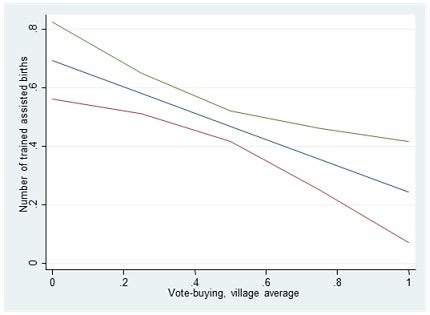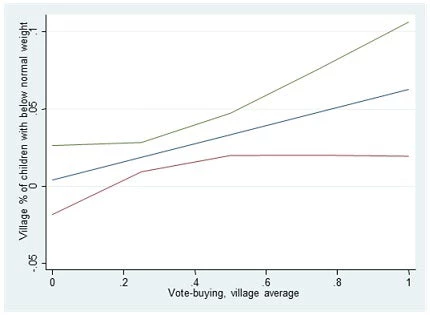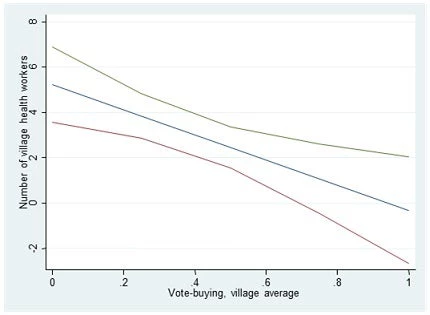There is one simple answer to the “what-will-it-take-to-end-poverty” question: it will take courageous politicians who actually implement the policies we already know are needed. Politicians, even the well-intentioned ones, are too often unable to implement good policies, because bad policies are needed for their political survival. For example, vote-buying, the direct exchange of “gifts” or money for political support during elections is widespread in many developing countries. For the first time, new research provides direct empirical evidence that where vote-buying practices are more prevalent, governments invest less in pro-poor services.
A survey was designed to be able to correlate vote buying with the delivery of health services, taking advantage of an appropriate institutional context in the Philippines. The data come from a jurisdiction level, where there is congruence between the political unit, where vote buying is measured, and the administrative unit, where a broad and potentially pro-poor service is delivered. Directly-elected municipal governments in the Philippines are responsible for delivering basic maternal and child services to villages in their jurisdiction. This allows for attributing the decision-making over political strategies, as well as a pro-poor public service, to the same political agents. Municipalities hire and manage nurses, midwives, and community or village health workers –key health personnel who deliver basic maternal and child health services to the poor.
The main finding: in places where households report greater vote-buying (in direct response to questions about offers of money in exchange for votes at the time of elections), municipal government records show lower investment in basic health services for mothers and children (fewer health workers and health projects). And, quite strikingly, as a summary measure of weak public performance, a higher proportion of children are under-weight.
In the paper, I go through detailed arguments for why this negative association between vote buying and public health services can be interpreted as reflecting the policy consequences of perverse politics. Where underlying conditions are conducive to the use of vote- buying or clientelist strategies, in which targeted benefits are provided in direct exchange for political support, the winning politicians will likely use fewer public resources for, and perform worse in, delivering broad, pro-poor public services. I also tested various alternate explanations, such as greater poverty driving both greater vote-buying practices and poorer health outcomes. The data do not support such alternatives.
Why, then, is vote-buying associated with weak political incentives to serve the poor? I’m not in a position (in this paper) to precisely answer this question, even though my results are consistent with what has generally been theorized in the political economy literature. However, one could make an intuitive argument in the opposite direction: where politicians have to woo demanding voters, they might offer all kinds of inducements to win political support, including gifts during elections and public services in between. This is why it was important to assess the association empirically.
One possible answer worthy of future investigation revolves around the quality of politicians, and the persistence of a bad political equilibrium. Political competition has become dramatically decentralized in developing countries, reducing barriers to entry for would-be contenders. Once vote-buying, and other related political strategies (such as violence), has emerged as an effective strategy for winning office, it can shape who wants to become a politician, and to what purpose. It can encourage the emergence of low-quality contenders who invest in building political support on the basis of vote-buying, so that once in power they can get away with low performance while extracting high rents from public office. (This is also one answer to the question Duncan Green posed in his recent blog).
There’s a dynamism to local politics in these countries. It can teach us about: when do well-intentioned politicians prevail, and rise through the ranks, sending the bad ones packing (instead of the other way around); how are good citizens, who see purpose in public service, encouraged to become leaders, thereby raising the quality of politicians and of politics. Available policy instruments (such as transparency; performance-based grants to local governments) could be better designed and operationalized by taking local political economy seriously. For example, even after growing evidence on how transparency and information can shift citizen behavior, a big unanswered question is whether politicians will respond, or, find more cunning ways to get around citizen demands.
If it will take politicians implementing pro-poor policies to end poverty, we would do well to understand more rigorously who they are, in the dynamic political markets of our client countries, and how to nudge these markets to get more courageous leaders to emerge.
Figure 1: Vote buying associated with higher proportion of under-weight children
Figure 2: Vote buying associated with fewer village health workers
Figure 3: Vote buying associated with fewer births assisted by trained health workers




Join the Conversation